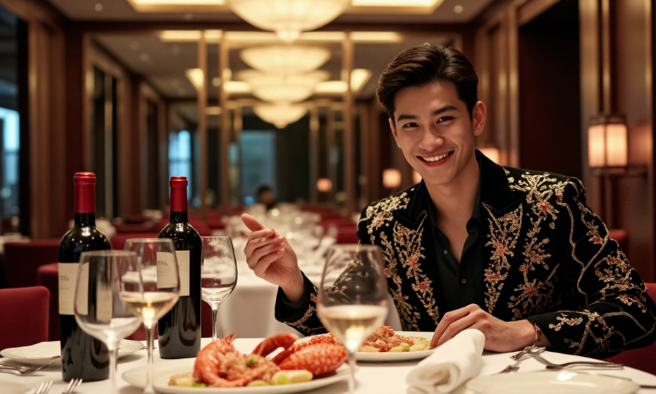In an era when consumerism is prevalent, Xiao Chen’s story is not an isolated case - he keeps chasing the items he owns, longing for the envy and praise of others until he consumes his family savings.
This behavior is far from a simple "vanity" that can be summarized, but reflects a profound psychological dilemma of modernity: a difficult attempt to construct self-worth through external material and recognition from others. Behind this seemingly irrational consumption behavior is the joint effect of complex psychological dynamic mechanisms, social comparison processes, self-identity crisis and emotional regulation models, which require us to conduct in-depth psychological analysis from multiple dimensions.

1. Mirror Self-Addition and Approval Addiction: Self-Construction in Others' Eyes
According to sociologist Curly's "mirror self" theory, an individual's concept of self is largely formed by imagining how others evaluate themselves. For Xiao Chen, the envy and praise of others have become necessary mirrors for constructing self-identity.
The neural mechanism of recognition of addiction: When he receives envy and praise from others, the brain releases dopamine and creates a sense of pleasure. This neural reward mechanism gradually forms an emotional dependence-it needs to be continuously recognized externally to maintain psychological balance, just as an addict needs medication to maintain normal state.
The separation of false self and true self: The concept of "false self" proposed by psychologist Winnicott is particularly related here. Xiao Chen may have developed a false self based on consumption and external manifestations, which is responsible for satisfying external expectations, while the true self (including its own fragility, anxiety and real needs) is hidden and ignored. The more the false self expands, the more the true self shrinks, and the gap between the two leads to a greater sense of psychological emptiness.
The eternal cycle of social comparison: Festinger's theory of social comparison points out that when objective standards are lacking, people evaluate themselves by comparing with others. For Xiao Chen, this comparison is no longer an occasional behavior, but becomes a compulsive psychological model, and he constantly looks for his position and value in comparison.
2. The alienation of consumerism: matter as an empty substitution for emotions
In consumerist culture, commodities no longer only have use value, but are also given symbolic value and emotional value. Xiao Chen's consumption behavior reflects this alienation of value.
Materialized substitution of emotions: Xiao Chen may not be able to obtain emotional satisfaction (such as intimacy, self-realization) through direct methods, so he transforms emotional needs into material pursuits. Every shopping becomes an attempt – trying to fill emotional voids with material and replace real emotional connections with purchases.
Chasing the Value of Symbols: Baudrillard's theory of consumer society points out that in modern society, what is consumed is not objects but symbols. What Xiao Chen pursues is not the use value of the item itself, but the symbolic value it represents - success, taste, status, etc. These symbolic values are recognized and reinforced in the recognition of others.
The paradox of instant satisfaction and long-term emptiness: Shopping provides an instant emotional satisfaction, but this satisfaction is fleeting and requires continuous repeated consumption behaviors to be maintained. This creates a vicious cycle: consumption → short-term satisfaction → the sense of emptiness that disappears faster → more consumption. This cycle ultimately leads to increased psychological tolerance—needing more, more expensive consumption to get the same satisfaction.
3. Instability in the self-esteem structure: internal lack of external authentication
Xiao Chen's behavioral pattern exposes a fragile and highly dependent structure of external self-esteem.
The dilemma of conditional self-esteem: His self-esteem seems to be based on conditions ("What I have, I am"), rather than unconditional self-acceptance. This conditional self-esteem is extremely fragile and needs to be continuously maintained through external achievements and possession.
Perspective of Self-Difference Theory: According to Higgins' self-Difference Theory, emotional discomfort occurs when there is a gap between the "real self" (actually possessed) and the "ideal self" (hopefully becoming). For Xiao Chen, consumption has become an attempt to narrow this gap - by having what others have, he feels closer to his ideal self.
Psychological mechanisms of overcompensation: Vanity consumption may be an overcompensation for deep anxiety. He may feel inadequate or insecure deep down, so he compensates for this feeling through external possession, trying to prove his worth to others and himself.
4. The failure of emotional regulation: Shopping as a coping strategy
Xiao Chen's consumption behavior may be a maladaptive emotional regulation strategy.
Emotionally regulated shopping turn: Shopping becomes a regulatory strategy when he experiences negative emotions (anxiety, depression, boredom, uneasiness). This strategy is effective in the short term, but in the long term it causes more problems (economic pressure, regret), which in turn increases negative emotions.
Pay attention to the temporary effect of dispersal: The shopping process requires concentration, which can temporarily distract him from his worries. However, this dispersion effect is short-lived, and the original problem has not been solved, but has added new pressure sources.
5. Family system and intergenerational transmission: the root of psychological model
Xiao Chen's behavior cannot be separated from his family background and understanding. Vanity consumption often has its family roots.
Emotional neglect and material compensation: In some families, parents may use material giving to replace emotional investment and recognition. This pattern may lead children to learn to equate matter with love and recognition, forming a distorted emotional cognition.
Transmission of values: A value may be conveyed subtly in the family: the value of an individual depends on external expression and possession. This value may be passed on to children through parents' words and deeds, rewards, etc.
Compensation for intergenerational trauma: Sometimes, vanity consumption is a response to intergenerational trauma. For example, if families have experiences of poverty or a history of low social status, future generations may try to get rid of this historical shadow by over-consumption.
6. Intervention and reconstruction: From external recognition to self-worth
Helping individuals like Xiao Chen requires multi-level intervention and psychological reconstruction.
Cognitive reconstruction therapy: helps him identify and challenge distorted cognitive patterns, such as "I have to have something to be valuable", "How others think of me determines my value", etc. Establish a healthier and more self-evaluation system based on intrinsic value.
Emotional regulation skills training: teach healthier emotional regulation strategies, such as mindfulness, emotional identification, problem solving, etc., and replace shopping as a means of emotional regulation.
Value clarification work: Help him clarify what is really important to him, distinguish his own value from social expectations, and establish a life direction based on his personal real needs and values.
Financial behavior intervention: Combining cognitive behavioral technology, formulate specific financial plans and consumption restrictions, and gradually establish healthy consumption habits.
Group support and identity: Participate in supportive groups, share and communicate with people with similar experiences, reduce loneliness, and gain alternative sources of identity.
Conclusion
Xiao Chen’s story is not only about personal vanity, but also about the general dilemma of seeking self-positioning and value in the modern consumer society. His behavior reflects an attempt to resolve internal emptiness through external possession, an effort to confirm self-existence through other people’s recognition.
The real problem is not his vanity, but his failure to find a path to true self-worth and satisfaction. This path is not about having more, but about needing less; it is not about how others view it, but about how one feels it; it is not about external manifestations, but about internal existence.
For Xiao Chen and each of us, the biggest challenge may be: how to maintain a connection with the true self in the heart in a world full of material temptations and external evaluations; how to find true self-worth and satisfaction in imperfections and limitations. This is not only a process of psychological adjustment, but also a self-salvation and pursuit of meaning under the conditions of modernity.
Ultimately, the solution may be to rediscover things that can bring satisfaction without consumption: sincere interpersonal connections, smooth experiences gained in meaningful activities, appreciation of nature and art, and inner joy of self-growth. These are the sources that can truly fill the inner emptiness and establish a stable self-worth.
